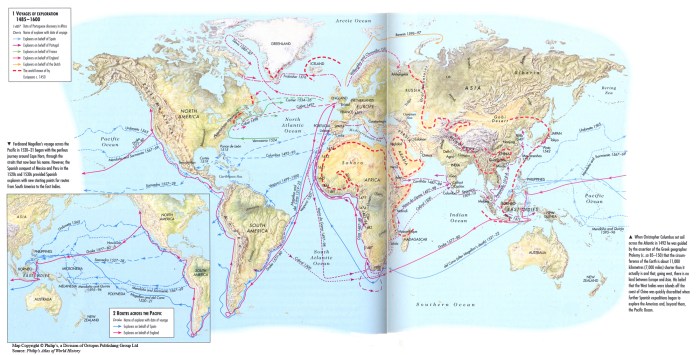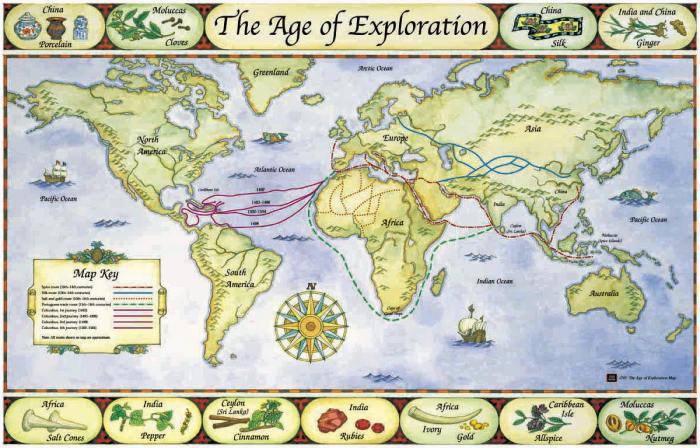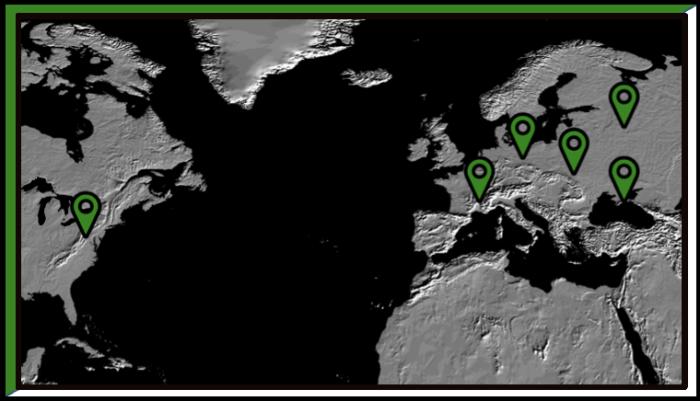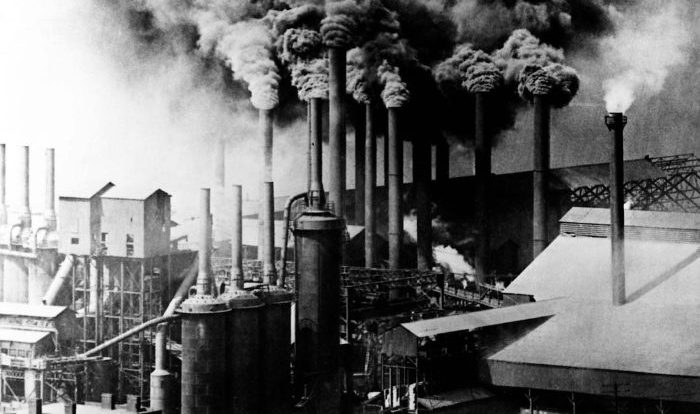World history voyages of exploration pdf – Embark on an extraordinary journey through the annals of exploration with our comprehensive guide, “World History Voyages of Exploration: A Comprehensive Guide to PDF.” This meticulously crafted document delves into the motivations, discoveries, and profound impact of intrepid explorers who shaped the course of human history.
Prepare to be captivated as we uncover the navigational techniques, technologies, and challenges faced by these pioneers. Witness firsthand the transformative encounters between explorers and indigenous populations, shaping cultures and fostering global exchange. Our exploration continues with an examination of the scientific and intellectual advancements sparked by these voyages, expanding our understanding of the world around us.
Voyages of Exploration in World History

Voyages of exploration were sea expeditions undertaken with the primary goal of discovering new lands, charting unknown territories, and expanding geographical knowledge. Motivated by a mix of curiosity, economic ambition, and political rivalry, early explorers embarked on perilous journeys across vast oceans.
A timeline of significant voyages of exploration includes:
- 1492: Christopher Columbus’s voyage to the Americas
- 1519-1522: Ferdinand Magellan’s circumnavigation of the globe
- 1768-1779: James Cook’s voyages to the Pacific Ocean
- 1831-1836: Charles Darwin’s voyage on the HMS Beagle
Major Explorers and Their Discoveries: World History Voyages Of Exploration Pdf
Key explorers in world history include:
- Christopher Columbus: Discovered the Americas in 1492.
- Ferdinand Magellan: Led the first expedition to circumnavigate the globe in 1519-1522.
- Vasco da Gama: Discovered a sea route to India in 1498.
- James Cook: Explored the Pacific Ocean and made significant contributions to cartography in the 18th century.
Methods and Technologies of Exploration

Explorers used various navigational techniques and technologies, including:
- Celestial navigation: Using the positions of celestial bodies to determine latitude and longitude.
- Magnetic compass: Indicating the direction of magnetic north.
- Astrolabe: Measuring the altitude of celestial bodies.
- Ships: Sailing vessels adapted for long-distance voyages, such as caravels and galleons.
Explorers faced challenges such as storms, scurvy, and hostile indigenous populations.
Cultural Encounters and Exchanges
Voyages of exploration led to interactions between explorers and indigenous populations, resulting in:
- Cultural exchange: Sharing of ideas, beliefs, and technologies.
- Cultural conflict: Clashes over land, resources, and religious differences.
- Long-term effects: Transformation of both indigenous and European societies.
Maps and Cartography
Maps played a crucial role in exploration:
- Guiding expeditions: Providing a visual representation of known and unknown territories.
- Documenting discoveries: Recording the geographical features encountered during voyages.
- Improving knowledge: Updating and refining existing maps with new information.
Economic and Political Impact of Exploration
Voyages of exploration had significant economic and political consequences:
- Economic: Expansion of trade routes, access to new resources, and establishment of colonies.
- Political: Territorial claims, conflicts between European powers, and the rise of global empires.
Scientific and Intellectual Impact of Exploration

Exploration led to scientific discoveries and intellectual transformations:
- Scientific discoveries: New species, geographical features, and natural phenomena were identified.
- Intellectual impact: Expansion of knowledge in natural history, geography, and astronomy.
- Cultural transformations: Exploration challenged existing beliefs and inspired new ideas about the world.
Legacy and Impact of Exploration
Voyages of exploration left a lasting impact on the world:
- Global interconnectedness: Linking different parts of the world and fostering cultural exchange.
- Expansion of knowledge: Transforming our understanding of the world and its geography.
- Cultural controversies: Raising ethical questions about the treatment of indigenous populations.
Answers to Common Questions
What were the primary motivations for early voyages of exploration?
Explorers were driven by a complex interplay of factors, including the search for new trade routes, the desire for wealth and glory, scientific curiosity, and the pursuit of religious or political objectives.
How did voyages of exploration contribute to the development of maps and cartography?
Explorers played a crucial role in advancing mapmaking techniques. Their observations and recordings helped refine existing maps and expand geographical knowledge, leading to a more accurate understanding of the world’s continents, oceans, and coastlines.
What were some of the major scientific discoveries made during voyages of exploration?
Explorers made significant contributions to natural history, geography, and astronomy. They discovered new species of plants and animals, documented diverse ecosystems, and expanded our understanding of the Earth’s physical features and celestial bodies.

